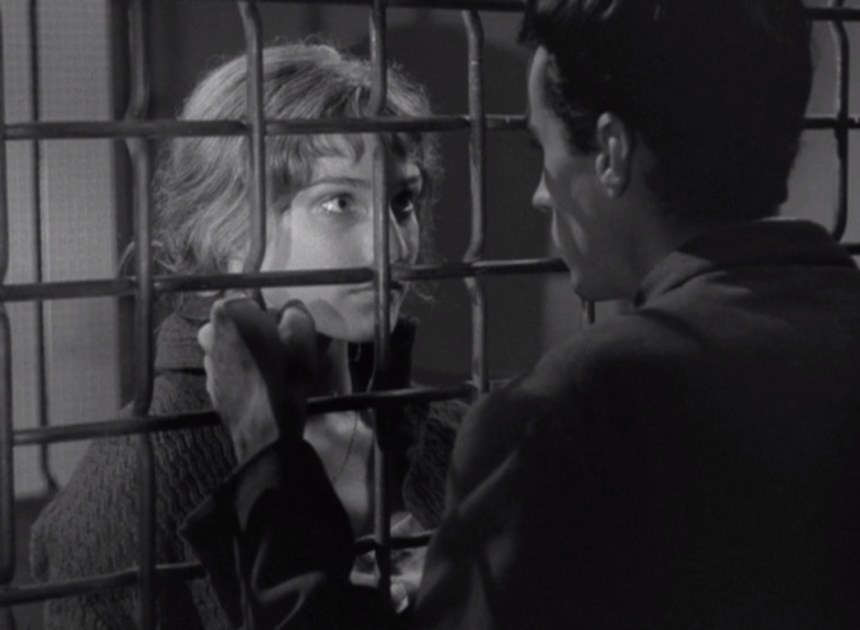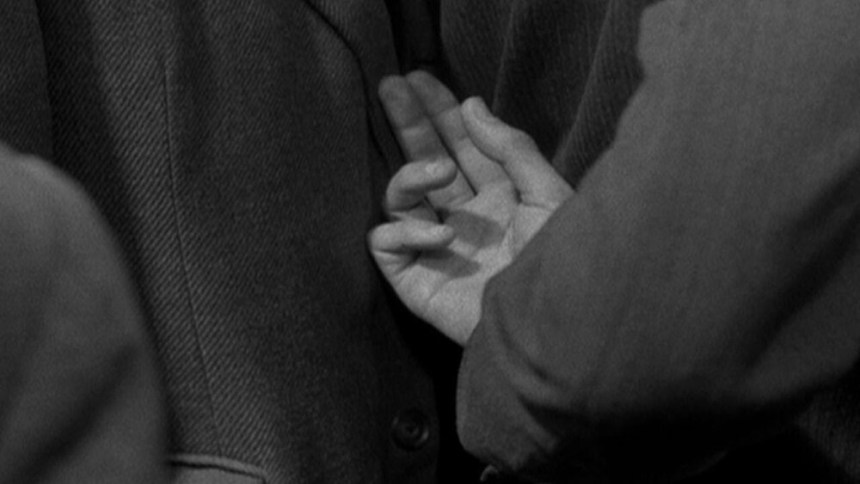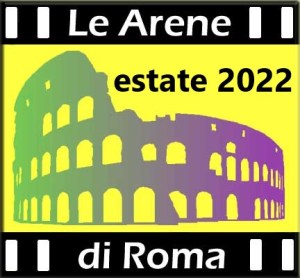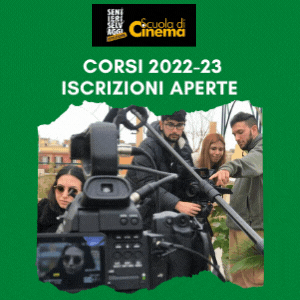Freely inspired by Dostoevsky’s Crime and Punishment, it leads to a purification of the soul of its protagonist with an enviable dryness of expression. A huge movie. MUBI
I would like to be able to see something else on the screen than bodies in motion, I would like to be able to make perceptible the soul and this presence of something superior that is always there, of that something that is God.
The cinema[tografo] by Robert Bresson “the devil probably”
Curated by the “Angelo Azzurro” Cinema Club, Castelfiorentino
In a – we think – by now unobtainable publication published by the Circolo del Cinema “Angelo Azzurro” of Castelfiorentino, it is possible to read two long and beautiful interviews with the French master, one, the one made by François Weyergans shortly before the filming of Au hasard Balthazar, which would become a decisive film for his filmography and perhaps one of the pinnacles of his career as an artist-director and the other curated by Jean-Luc Godard and Jacques Doniol-Valcroze. Beyond the merit of the two interviews, the first above all – despite the other having its main theme as its main theme Pickpocket – it allows us to enter the director’s artistic world and to understand, better than on other occasions and from an internal and personal perspective that is purely creative or at least as a function of perpetual creativity, that the transcendent Schrader talks about in relation to that cinema does not it is the result of an interpretative fantasy, it is not the result of a chemical alchemy of a passionate builder of theorems, but a real desired, researched and consolidated effect of a director who never ceases to fascinate for this research, who never ceases to remind us of the ascetic of the artistic-cinematographic expression and that does not stop, finally, to be passionate about its transparent cinema e simply complex, made up of unexpected and surprising solutions, give it to you invisible camera movements to the ontological difference that separates those images from any theatrical representation, underlining the semantic difference between cinema and cinema. When asked why you talk about cinema and not cinema, Bresson replies: Because in my opinion the cinema is the photographed theater and the rooms where films are shown. The term cinema is instead synonymous with cinematographic art.

It is under these auspices and these forms of the filmmaker’s complex poetics that must be read and interpreted Pickpocket. Diary of a thief from 1959. Freely inspired by Crime and Punishmentwhich together with the rest of Dostoevsky’s work remains one of the cornerstones of Bresson’s artistic production, which with its continuous references to The idiot or for example to the story The mild which inspired him So beautiful, so sweet or again, Four nights of a dreamerfurther transposition of The white nightselected the Russian writer as his mentor in the exploration of the conscience of his characters.
Michel is a thief and lives by robbing on the subway or at horse racing. He is not inclined to theft, but he intends to hone his techniques. He loves his mother, but even when he is dying he does not enter his house, despite the constant insistence of Jeanne, the girl who lovingly cares for her. Targeted by the police, Michel will flee Paris. When he returns, some things will have changed.
In Pickpocket Bresson, immediately announcing his intentions with a long caption that warns that it is not a detective film, directs his viewer towards that interpretation of the film which, thanks to an enviable expressive dryness – just 74 minutes in duration – leads towards a purification of the soul of its protagonist and the sharing of a common earthly pain – completely excluded from the scene, but constantly visible in the filigree – with the other protagonist of the film, Jeanne, who unconsciously becomes the ultimate goal of the film, the sign of a second chance; a function so decisive that of the female character, but which at the same time belongs to that invisibility that marks the author’s cinema. Jeanne represents the reason that pushes Michel towards a possible redemption (“I will become honest”, he tells her) and everything seems to find reason in that underground and silent call that Michel feels in Jeanne’s presence and that makes her guilt heavier. It is in this capacity that Jeanne becomes instrumental in Michel’s final path of purification.
In other words, it is not of God that we are talking about, but of something earthly that looks upwards, of a union of souls or spirits, if you prefer that it has nothing to do with religion, but has something to do with it. dealing with spirituality which is not the exclusive prerogative of religious concepts. Bresson does not rediscover himself as secular, but reaffirms himself as spiritual. His cinema is a radical spirituality extraneous to any fashion and crosses time intact in its dry essentiality, Pickpocket it becomes existential viaticum and measures the relationships with an intimacy that is resolved in the critical consciousness of the self and with the external world that is determined, by reflection, as a mirror of a guilt and a push towards redemption. Themes that concern the entire Bressonian work that in this incessant confrontation with oneself has often preferred the diary form as the intermediary of every intimate confession. Already Diary of a country priest constitutes a more than clear proof of this predilection, in Pickpocket the narrative formula is repeated with equal effectiveness, accentuating the characters of an entirely internal dialogue to which, of course, the diary form preludes, marking the heartfelt path of amendment from that synthesis of the use of hands that from soft and ductile to shoplifting with skill wallets become the emblem of punishment when they are tightened at the wrists by the handcuffs that snap to arrest the thief in the act of crime. Hands are the most evident yet – here too – most invisible manifestation of being. It is in those images, which know how to faithfully translate Michel’s thought, that the ethereal consistency – but so long-lasting – of Bresson’s cinema must be sought. Also in the previous one A death row inmate escaped not only the hands mark the incipit of the film, but they become the tool that puts thought into action with the solutions for escape. On the other hand, it was Godard who said that “man thinks with his hands, and the job of the director / editor confirms this”. Bresson makes this phrase his own, in fact, in his recurring images of his films, even in subsequent ones, anticipating any other theorization.
The cinema of the French director, therefore, develops within precise formal coordinates that a natural antitheatricality that enhances the nature of cinema and that is expressed in the accentuated fixedness sought by its protagonists, in that austere disinterest in the facts if not for those that they work in the dark part of consciousness. Robert Bresson’s cinema proposes a utopian-mystical vision that reveals itself in the progressive and laborious purification.
It is the eternal dualism between good and evil, between guilt and redemption, between aspiration to an earthly faith towards a God whom one doubts (“I believed in God for three minutes”, Michel will say) and the evil inherent in human nature, that Bresson moves his protagonists in his rigorous cinema that does not wear out over the years.
Original title: Pickpocket
Director: Robert Bresson
Interpreters: Martin LaSalle, Marika Green, Jean Pélégri, Dolly Scal, Pierre Leymarie, Pierre Étaix, Kassagi
Duration: 74 ′
Origin: France, 1959
Drama
The evaluation of the film by Sentieri Selvaggi
The vote of the readers
( votes)
————————————————– ————
The Summer Cinema Arenas in Rome

————————————————– ————


